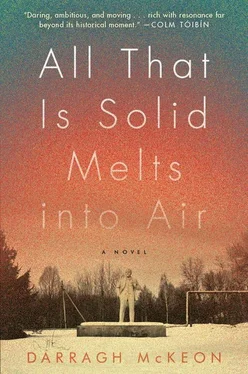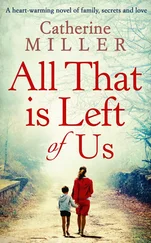“Yevgeni, go to the front of the line. You can give us a demonstration on how it’s done.”
A titter around the class. If you’re in charge, you’re always funny. The gym master could give them a lecture on how to manufacture a gym mat and everyone would still laugh. Yevgeni wishes he could refuse, wishes he could run out of the door, but he isn’t suicidal. He’d prefer the class to see his raggedy underwear than face the gym master after an episode like that.
He walks towards the front of the nearest line, his lips pursed in defiance.
“No walking,” the gym master shouts.
As he reaches the front, Yevgeni is struck with a moment of genius. He’ll run to the other side of the rope and climb up facing the queue. This way the tear in his shorts will be nearest the wall, the side opposite side to the gym master.
Why has his mother not bought him a new pair? He has asked her. She said she would. And he knows that when he goes home and tells her what happened she’ll scold him for not reminding her. “I can’t be expected to remember every tiny thing,” this is what she’ll say.
The gym master blows his whistle and Yevgeni sprints forward. He reaches the rope, runs around the other side of it, and begins climbing. Already the other kids are laughing at him, but it can’t be helped. What he’s done is still the best option.
The gym master looks at the queue of kids and tells them to be quiet and, while he does so, the bottom falls out of Yevgeni’s world. The worst thing that can possibly happen happens. Arkady Nikitin, the sweatiest boy in the class, is climbing beside Yevgeni and is even lower down the rope—due to his sweaty hands—and so he sees the tear in Yevgeni’s shorts and sees the gym master looking away, and so he tugs hard at the shorts and Yevgeni hears the rip and looks down to see his shorts floating to the ground away from him, taking his scraggy underpants with them. And then the whole class sees this. They look up and see Yevgeni stopped in shock, almost at the top, his grey underpants lying sprawled on the floor in full view of everyone, like a rat that has lain in the middle of the road for weeks, entrails spread out in opposite directions.
A gale of laughter, the whole class dissolving, and Yevgeni can see the gym master laugh too, briefly, and then he starts to shout at Yevgeni to get down at once.
The gym master has a bald spot, which can be seen clearly from up here. Yevgeni stays frozen, clutching the rope, and the longer he holds on, the more irate his gym master becomes. He can see the man’s face turning red. Yevgeni clamps his feet around the rope, the way they’ve been taught, and closes his eyes. There’s no way he can come down now and face the embarrassment, the rage. He seals his lids shut and hums the beginning of Chopin’s Raindrop Prelude, the notes dropping their peace on him. The sound of rain ticking on a glass windowpane; leaves rustling with falling water. The notes caressing him, refreshing him, sweet Chopin drenching him. He can feel the rope swaying wildly: the gym master is trying to shake him down. But Yevgeni isn’t moving—if he wants him to come down, he’ll have to climb up to get him. Yevgeni clings on for his life, ten metres in the air, the rope burning his fingers, chord sequences pattering along his shoulders.
Two hours later Maria leaves the principal’s office. She walks past Yevgeni as he slumps on a chair outside, and when she passes he picks up his bag and scurries after her. She moves quickly when she’s annoyed. So he can tell she’s annoyed.
“I’m sorry.”
“I don’t want to hear it.”
“I didn’t mean to cause trouble.”
“Well, you’ve caused it. You had me leave work early. I do this two times a year, maybe it’s okay. How many times is this?”
“I don’t know.”
“I know. It’s four. I’ll be lucky if I’m not fired.”
“I’m sorry.”
“You’re not sorry. This is not good, Zhenya, especially not now.”
It isn’t fair to blame the child for her problems at work. But still, he did call her . He could have called his mother. So maybe he deserves it.
“You could have called your mother.”
She realizes he’s not responding. She looks to her side, but he’s not there. He’s stopped. She’s the one walking quickly. She’s the one who’s angry. He’s the one who should be keeping up. She stops and looks back. He’s standing there with his bag around his ankles. They’re in the playground by now, in full view of how many hundreds, if not thousands, of kids, and yet Zhenya has no qualms in putting down his bag, causing a scene, his hands clamped to his head, holding clumps of hair in his fists. No wonder they pick on him—the child is a gaping wound. Maybe this is to do with not having a father, or with too much mothering, with the women being too indulgent because of his talent. Who knows? Let Alina deal with it. He’s not her child, after all, and she’s not in the mood for it today.
She paces back to him and grabs his arm and drags him back into motion, and he’s as raggedly obedient as a stitched doll.
This child needs to learn some things.
They get on the Metro and talk it out. Yevgeni explains what happened and Maria can see a kind of logic behind it. The things you can’t do as a kid, the actions you can’t take, how the smallest things become magnified, reaching crisis point.
She stops him midsentence.
“Show me your arm.”
“What?”
“Show me your arm.”
Yevgeni pulls his sweater back. Nothing. He knows what she’s looking for already, trying to look casual. Nothing escapes this kid.
“The other one.”
“No.”
“Why not?”
“Okay, it’s there, you don’t need proof, Mam has seen it already.”
“It’s a Chinese burn then.”
“Yes.”
“Do we need to be worried?”
“No.”
“Zhenya?”
“No.”
“Are there a lot of other kids getting them? Be honest now.”
“Yes. Loads.”
“You’re not the only one.”
“No. We do it all the time.”
Taunts, name-calling, ear smacking, spitting, kicking, teachers handing out beatings, snot flicking, note passing. Thank Christ she isn’t still in school.
She’ll let the subject rest, but she can’t guarantee that she won’t come back to it. It’s a fine balance, being a live-in aunt. She wants him to confide in her, but she feels many of the maternal responsibilities, the same irrational fears, as Alina does.
“I have a question,” Maria says. “Do you know any Prokofiev?”
“Eh”—he thinks for a minute—“no.”
“Do you know who Prokofiev is?”
He looks at her, eyebrows raised. Of course he knows who Prokofiev is. That’s like asking who Lenin is.
“My manager at work is asking about a recital. If you played for them it would be a big help to me.”
But he doesn’t know any Prokofiev.
“But I don’t know any Prokofiev. Do I have to play Prokofiev?”
“I don’t know. Maybe not. I’m just asking, in theory, if you had to. It might not happen.”
He says “yes.” He says “of course.” But he hunches in on himself in a way Maria knows. He doesn’t want to do it. He’s worried about his timing. He’s worried about everything.
The train pulls into their stop and they get out, the platform so empty, everybody still at work, and Maria feels an urge to get back on the train and make the most of the afternoon, take him to Red Square, have him walk around the shops in GUM, let him smell real food, perfume; touch fur. The child has never experienced what it’s like to run your hand along a shining pelt. Or they could have tea in the Metropol, have waiters bow to them, hear the clink of teacups, go to a show in the Bolshoi, put his hand on the appliqué wallpaper. Be other people for an afternoon.
Читать дальше












